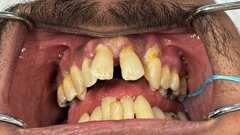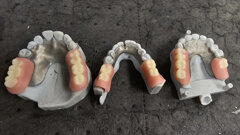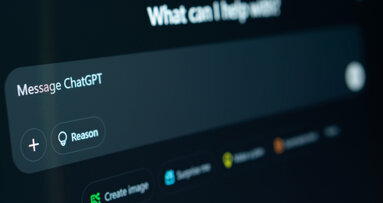AMMAN, Jordan: As artificial intelligence continues to expand its role in healthcare, large language models such as ChatGPT are increasingly being used to seek health-related information. In dentistry, where patient education is essential and misinformation online is on the rise, it is particularly important to evaluate the reliability of such tools. Given the well-established impact of tobacco use on oral health—including its association with periodontal disease, tooth loss, oral cancer and impaired healing—a new study has assessed how effectively ChatGPT responds to public questions on this important topic.
The researchers—from the University of Jordan and the Kuwait Ministry of Health in Sulaibikhat—generated a pool of commonly asked questions using online tools. These questions, frequently posed to chatbots and search engines, covered areas such as periodontal conditions, teeth and general oral health, soft-tissue health, oral surgery, and oral hygiene- and breath-related concerns and were reduced to 119 questions. Responses were generated by ChatGPT 3.5 and assessed by the researchers based on the parameters of usefulness, readability, quality, reliability and actionability.
Most responses were judged to be either very useful (36.1%) or useful (42.0%) and of moderate (41.2%) to good quality (37.0%). However, just 23.5% of responses scored highly in terms of actionability and 35.3% were found to be only moderately easy to read.
When responses across the different topics were compared, the tool’s scores were found to vary. Responses to questions on specialised topics were less useful, including those relating to the effects of tobacco use on oral soft tissue and on oral surgeries.
Commenting on previous studies that have found that ChatGPT excels in specialised subjects and is even capable of passing dental examinations, the researchers highlighted that the format of the prompting questions affects the quality and reliability of responses. “This discrepancy may be due to differences in question formats, as our general inquiries differ from the structured, academic nature of test-based questions,” they explained.
The technology was found to competently address general questions and to perform more poorly on more detailed questions and/or specialised topics. “For example, ChatGPT failed to consistently generate accurate and comprehensive responses to the majority of radiation oncology patient-centred questions, particularly across less common cancers and with ‘negative control’ questions that included incorrect assumptions,” the authors wrote. Highlighting that the usefulness of health-related information for the public rests on its readability and understandability, the researchers stressed the need for artificial intelligence tools to effectively balance quality and simplicity in their responses.
In summary, the authors concluded that ChatGPT is a valuable tool for providing general information related to the effects of tobacco use on oral health, but that it faces challenges in readability, consistent actionability and quality of responses on specialised topics. “While ChatGPT can effectively supplement healthcare education, it should not replace professional dental advice,” the authors concluded.
The study, titled “Assessing ChatGPT’s suitability in responding to the public’s inquiries on the effects of smoking on oral health”, was published online on 19 July 2025 in BMC Oral Health.
Tags:
NEWCASTLE UPON TYNE, England: The systematic and oral health effects of smoking are well established, including reduced calcium absorption, altered vitamin ...
CHELMSFORD, England: The public-facing nature of dentistry has led to clinicians becoming increasingly involved in caring for patients’ systemic health, ...
ŌTSU, Japan: The links between diabetes, obesity and periodontal disease are well established; however, most studies on their associations have had sample ...
BUFFALO, N.Y., US: Research has shown that smoking cannabis can be detrimental to overall health and can have adverse effects on the lungs, heart and brain....
MANCHESTER, England: Perhaps the most useful and pervasive application of artificial intelligence (AI) in the average person’s life is the large language ...
HONG KONG: According to the Global Burden of Disease study, early childhood caries affects approximately 530 million children around the world, making it ...
LONDON, Canada: The use of artificial intelligence (AI) in dentistry is rapidly expanding, offering new possibilities in diagnostics, treatment planning and...
Artificial intelligence (AI) has seen a rapid surge in popularity and accessibility in dentistry, and more broadly in healthcare. Publicly available AI ...
Live webinar
Wed. 18 February 2026
9:00 am EST (New York)
Dr. Anna Lella, Ms. Francesca Nava
Live webinar
Wed. 18 February 2026
12:00 pm EST (New York)
Prof. Dr. João Caramês CODE expert, Dr. Robert Gottlander DDS
Live webinar
Mon. 23 February 2026
3:00 am EST (New York)
Ass. Prof. Elizabeth Shick, Dr. Zehra Yonel
Live webinar
Tue. 24 February 2026
1:00 pm EST (New York)
Prof. Dr. Markus B. Hürzeler
Live webinar
Tue. 24 February 2026
3:00 pm EST (New York)
Prof. Dr. Marcel A. Wainwright DDS, PhD
Live webinar
Wed. 25 February 2026
11:00 am EST (New York)
Prof. Dr. Daniel Edelhoff
Live webinar
Wed. 25 February 2026
1:00 pm EST (New York)



 Austria / Österreich
Austria / Österreich
 Bosnia and Herzegovina / Босна и Херцеговина
Bosnia and Herzegovina / Босна и Херцеговина
 Bulgaria / България
Bulgaria / България
 Croatia / Hrvatska
Croatia / Hrvatska
 Czech Republic & Slovakia / Česká republika & Slovensko
Czech Republic & Slovakia / Česká republika & Slovensko
 France / France
France / France
 Germany / Deutschland
Germany / Deutschland
 Greece / ΕΛΛΑΔΑ
Greece / ΕΛΛΑΔΑ
 Hungary / Hungary
Hungary / Hungary
 Italy / Italia
Italy / Italia
 Netherlands / Nederland
Netherlands / Nederland
 Nordic / Nordic
Nordic / Nordic
 Poland / Polska
Poland / Polska
 Portugal / Portugal
Portugal / Portugal
 Romania & Moldova / România & Moldova
Romania & Moldova / România & Moldova
 Slovenia / Slovenija
Slovenia / Slovenija
 Serbia & Montenegro / Србија и Црна Гора
Serbia & Montenegro / Србија и Црна Гора
 Spain / España
Spain / España
 Switzerland / Schweiz
Switzerland / Schweiz
 Turkey / Türkiye
Turkey / Türkiye
 UK & Ireland / UK & Ireland
UK & Ireland / UK & Ireland
 Brazil / Brasil
Brazil / Brasil
 Canada / Canada
Canada / Canada
 Latin America / Latinoamérica
Latin America / Latinoamérica
 USA / USA
USA / USA
 China / 中国
China / 中国
 India / भारत गणराज्य
India / भारत गणराज्य
 Pakistan / Pākistān
Pakistan / Pākistān
 Vietnam / Việt Nam
Vietnam / Việt Nam
 ASEAN / ASEAN
ASEAN / ASEAN
 Israel / מְדִינַת יִשְׂרָאֵל
Israel / מְדִינַת יִשְׂרָאֵל
 Algeria, Morocco & Tunisia / الجزائر والمغرب وتونس
Algeria, Morocco & Tunisia / الجزائر والمغرب وتونس
 Middle East / Middle East
Middle East / Middle East












































To post a reply please login or register